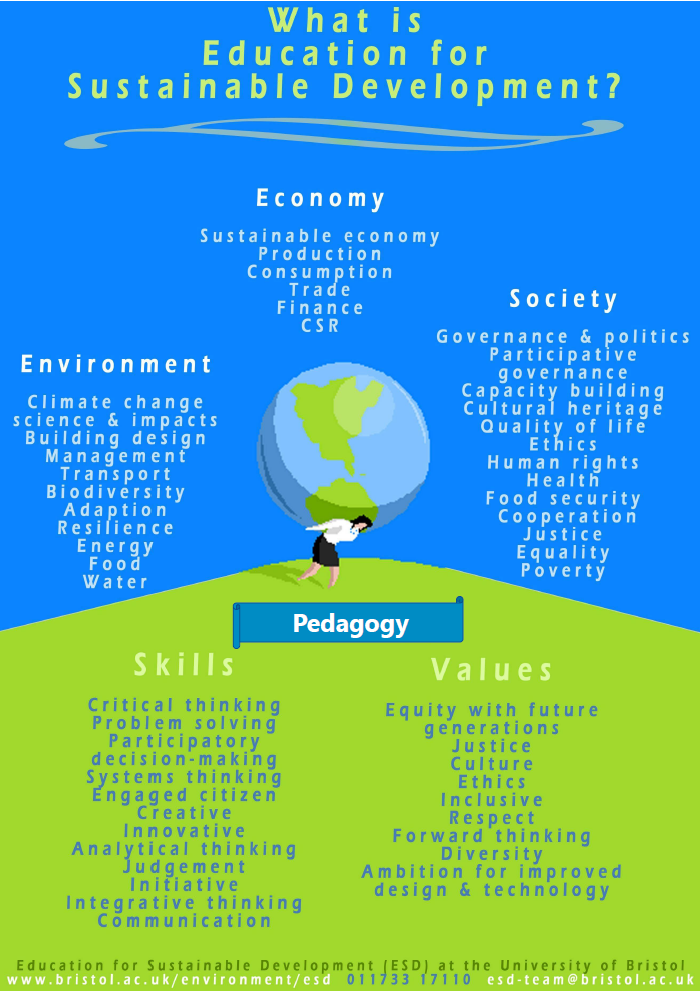Before the lectures
Next week I will teach the first of three lectures which constitute the Science of Sustainable Development within the Sustainable Development course at the University of Bristol. This is an open unit and can therefore be attended by first year undergraduate students from across the university.
The figure below shows how Sustainable Development is considered at the University of Bristol, clearly a hugely interdisciplinary and wide subject area!
Traditionally this unit has attracted a significant fraction of its cohort from Geographical Sciences, which is my current home department. This should make preparation of these three lectures relatively straightforward right? Wrong.A fascinating aspect of the School of Geographical Sciences is its breadth and variety of research and expertise. This is the case not simply because our physical geographers work on everything from past climates to flood inundation modelling but also because there is also the ‘human’ side to geography. My human geography colleagues research and teach on topics as varied as spatial and historical patterns of electoral voting and taxidermy.
This highly varied student body is complicated further by my own personal background. I am a ‘pure’ physicist by training, having studied for my PhD in the nanoscale physics of solar cells and LEDs. After my PhD I have mostly been a climate modeller, with some time spent in environmental consultancy and so my career has been undeniably ‘environmental’ from start to finish so far. That said, I would struggle to think of more than a few topics in my undergraduate days which were explicitly linked to sustainability. Perhaps this is not surprising however when one considers how large the core of physics is as a university-level subject. How can lecturing staff make quantum mechanics and astrophysics relevant to Sustainable Development? Is it even possible or meaningful? These questions are certainly outside the scope of this short blog post!
Moving back to the subject matter of my lectures, I had to consider what links climate change, climate modelling and environmentalism in such a way that the term Sustainable Development can be introduced scientifically in three parts? When I posed this question to myself in this way, the answer was clear; The Intergovernmental Panel on Climate Change, or IPCC for short, not to be confused with the Independent Police Complaints Commission! This body was founded by the UN and World Meteorological Organisation in the late 1980s to provide a synthesis on the state of knowledge of the climate system and how humans are interfering with it. The IPCC has to date published five of these Assessment Reports and they are split into three Working Groups:
The bulk of my work since 2008 (at the Met Office and at Bristol) has concerned climate modelling and therefore fits well within the remit of Working Group one. Theoretically I could have stopped there and taught three lectures on the meteorology and climatology of climate change, this would probably however only really appealed to those students who had taken A Level physics. The natural diversification of the three Working Groups was the only solution and I therefore decided to prepare one lecture on each. This also provided me with an opportunity to improve my own knowledge of Working Groups 2 and 3, something I had been meaning to do for a while! I should state at this point that there is no scientist in the world with an in depth knowledge of every aspect of even one of the Working Groups. Working Group 1 alone has over 1500 pages of fully cited scientific text for example!
After lecture one
As I write this part of the blog post I have just given my first lecture in the series. This lecture tallied well with my research interests and scientific knowledge and I now have a little under a week to finish my preparation for the next two lectures. Crucially, my biggest challenge will undoubtedly be the effective teaching of Working Groups two and three and I will aim to report back with another blog post after my lectures have run their course.
Finally, one aspect of this course which I hope that will come across in my teaching is my aim to emphasise the interdisciplinary nature and breadth of this subject. As I said in my first lecture, I am a physicist working in a geography department and lecturing to students from all five faculties. If this doesn’t illustrate the cross cutting nature of this subject then I don’t know what does!

